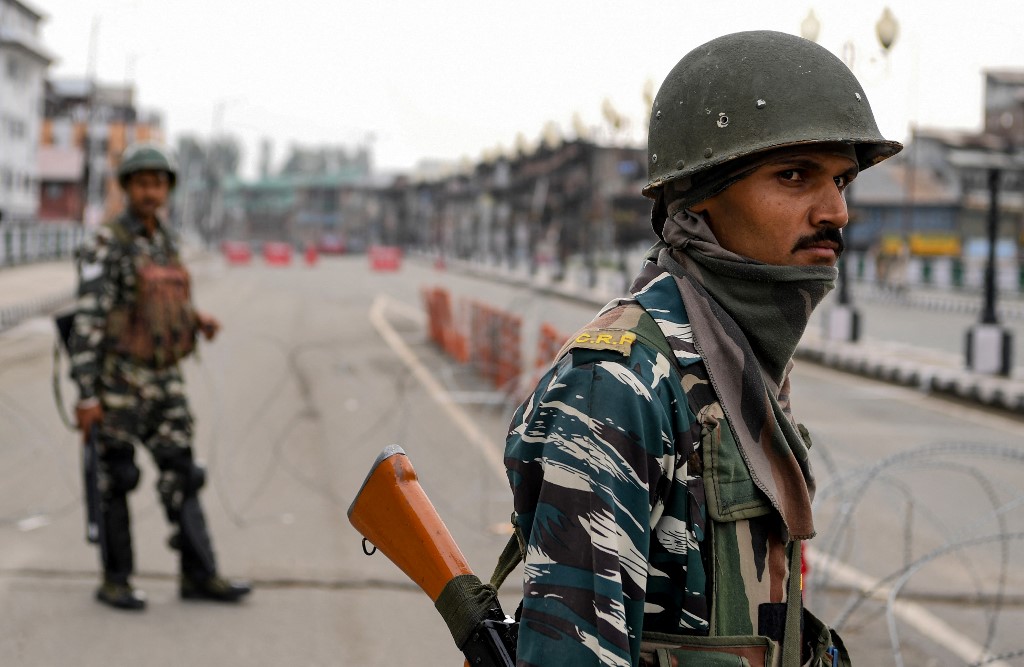Pakistani prime minister tells MEE threat of conflict over disputed territory is the world’s most dangerous ‘nuclear flashpoint’

Imran Khan speaking to MEE in Islamabad last week (MEE/Huthifa Fayyad)
By Peter Oborne and David Hearst
India enjoys the same kind of impunity within the international community over its attempts to change the demographic balance of Kashmir that Israel has in the occupied Palestinian territories, Pakistan’s Prime Minister Imran Khan has told Middle East Eye.
He accused his counterpart Narendra Modi, the Indian prime minister, of copying Israel’s playbook by allowing settlers to acquire land in the disputed territory, which has been claimed – and fought over – by both Pakistan and India since 1947.
‘Once two nuclear armed countries get into the situation like we did, it can go anywhere’
– Pakistan Prime Minister Imran Khan
Khan called Indian-administered Kashmir an open prison. He accused India of breaching the Geneva Convention by changing the Indian constitution to end Kashmiri autonomy.
In August 2019, Modi sent tens of thousands of additional troops into the Muslim-majority state, imposed a curfew and announced the abolition of Article 370 of the Indian constitution – which guaranteed autonomy to Kashmir for more than 70 years.
Many Kashmiris fear the ultimate intention of the Modi government is to fundamentally change the demographic of the region by allowing people from outside the state to buy land.
Khan told Middle East Eye that India had not been challenged more forcefully on the international stage because its western allies saw it as a bulwark against China.
But he said India had also benefited from a deepening strategic and military relationship with Israel, forged by Modi’s visit to the country in July 2017, and by then-Israeli Prime Minister Benjamin Netanyahu’s return visit to India the following year – after decades of diplomatic estrangement.
The relationship has included the joint development by Israel Aerospace Industries and Indian contractors of the Barak-8 aerial defence system for use by both countries’ militaries, which was described by Indian Defence Minister Rajnath Singh last month as a “game-changer”.
https://youtube.com/watch?v=CEZXqd5Qxpg%3Ffeature%3Doembed%26enablejsapi%3D1%26origin%3Dhttps%253A%252F%252Fwww.middleeasteye.net
Khan said India had also drawn on Israel’s illegal and brutal occupation of the Palestinian territories and the impunity the country has enjoyed as a consequence of its alliance with the US, in its own quashing of opposition and criticism of its actions in Kashmir.
“[Israel has] built such a strong security apparatus and [they] just crush anything. They send people who kill and assassinate and they have total immunity,” he said.
“Whatever the UN general assembly says, they have complete confidence in the veto the US has in the Security Council. So they get away with anything. And I feel that India feels [it has immunity] because they are being used… as a bulwark against China.”
World’s ‘nuclear flash point’
A ceasefire has generally held along the Line of Control in Kashmir since an agreement in February this year, but tensions remain high and there have been reports of exchanges of gunfire in recent weeks.
The two countries have fought three wars since independence in 1947. The last major flare-up in 2019 was defused after Pakistan handed back an Indian pilot whose plane had been downed in Pakistani airspace.
The incident started when a Pakistan-based militant group attacked Indian soldiers in Indian-administered Kashmir, killing more than 40 paramilitary troops in a car bombing.

Asked by MEE how volatile the current situation was, Khan replied: “If you look at the flashpoints, probably the nuclear flashpoint right now in the world is Pakistan-India because nowhere else is there a situation where there are two nuclear-armed countries who have had three wars before they were nuclear-armed.”
He added: “We have not had a war since then because of the deterrent.”
Still, he admitted that dealing with the flare-up in 2019 in the early months of his premiership had been a nervous and dangerous time: “Once two nuclear-armed countries get into the situation like we did, it can go anywhere.”



